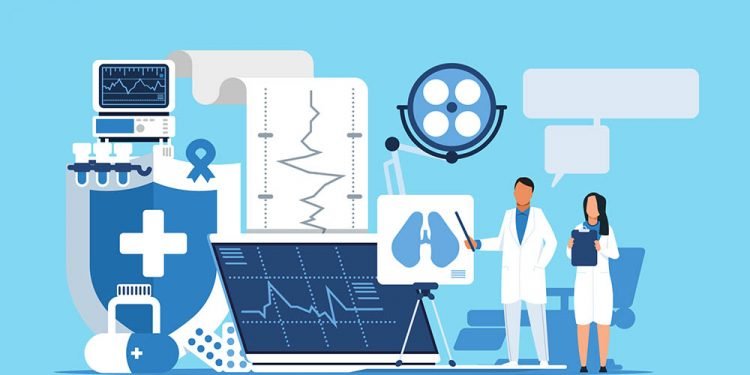Advanced Health Management Systems are software packages that help medical practices manage patient records, generate reports, and process insurance claims. These systems also provide services such as scheduling, lab and clinical interfaces, e-prescribing, and intra-office messaging. They are produced by Advanced Health Management System LLC, a company based in the United States. They are designed to be used in general practices, family practices, and ambulatory care settings.
Advanced Health Management EHR
Modules
Modules of Advanced Health Management System are computer programs that support clinical workflow and improve patient care. These programs also help with medical record-keeping and appointment scheduling. These programs can be customized to meet individual healthcare needs and requirements. They can integrate with third-party modules to provide a comprehensive solution to hospitals’ needs. This software can help achieve value-based patient care, improve health outcomes, and lower costs.
The medical records module stores information about patients and their medical histories. This data is used to schedule appointments and to send discharge recommendations. Another module, medicine management, contains a list of all drugs prescribed for treatment. This program also maintains records about medications used during a patient’s stay in the hospital. In addition, the lab management module can generate test results for specific patients. In addition, these systems can interact with a payment gateway and record all money transactions for the hospital.
The healthcare industry has become increasingly complex and regulated. Increasing life expectancy has increased the demand for healthcare professionals. However, healthcare is a complex industry, and many mid-career professionals may find it difficult to transition into a new role. In response to this demand, healthcare professionals and academics designed the Advanced Certificate in Healthcare Management & Leadership.
A hospital management system must also incorporate a billing module. It should provide fast, accurate, and secure payment processing, as well as the ability to offer variable-rate plans. It should also allow for patient appointment and visitor check-ins. The system should also allow the hospital to analyze its financial situation and develop strategies to improve its financial position.
Applications
Hospitals are using advanced technology to help manage the care of their patients. HMS software helps them organize and store patient data for quick and easy access. The information can determine the patient’s history and current condition. It can also track the doctors and other professionals involved in the patient’s care. It can also provide billing information and test reports. Depending on the software, data from the HMS can connect the dots about a patient’s history. It is a kind of health chart, and it can be accessed by entering the patient’s name and medical record number.
The Advanced Health Management System (AHMS) is a cloud-based EMR & practice management system that offers a variety of features and functionality. It can be deployed on-premise or in the cloud and is HIPAA and Meaningful Use-compliant. Other features include scheduling, lab/pharmacy integration, e-prescription, and patient demographics.
In addition to being able to analyze patient data, an HMS can also use AI to make decisions. It can monitor and collect health data from several different sources and transfer it to other systems, including the doctor’s office. This technology allows the doctor to manage multiple patients using one application. It can also be used to monitor the patient’s health condition remotely.
The advanced Health Management System has many benefits for hospitals. It helps doctors manage patients’ appointments, manage physician schedules, and track medicine, blood bank details, and test results. It also helps hospitals manage financial information. It can even help hospitals integrate their patient care.
Integrated Vehicle Health Management
An Integrated vehicle health management system (IVHM) is a system that monitors and controls a vehicle’s health. This system is a combination of diagnostics, prognostics, and intelligent reasoning. The information it collects from the vehicle is sent to the Vehicle Manager, which can automatically perform operations to minimize the effect of any faulty systems.
The objective of IVHM is to provide more accurate diagnostics and prognostics for vehicles, improving overall safety. It uses self-monitoring equipment, embedded sensors, and diagnostic reasoning to make these assessments. Typically, vehicles have an onboard data acquisition module to collect data, which can then be transferred back to the base through various rf systems. Using this data, the system can determine whether a vehicle is experiencing problems that are unique to it or if it is experiencing a trend of depreciation across the fleet.
Increasing disposable income and concern over vehicle safety are driving demand for the integrated vehicle health management system. While there are some challenges, there is a clear growth potential in this market. In developed countries, vehicle manufacturers focus on commercializing the system into mainstream light duty vehicles. In developing regions, however, the technology is still in its early stages.
The global market for an Integrated vehicle health management system is expected to reach USD 12 billion by 2020 and grow at a CAGR of 13% over the next five years. Integrated vehicle health management systems can help maintain the health of vehicle systems by predicting the life expectancy of critical components. They also help improve operational decisions by reducing the number of unexpected faults. In addition, an Integrated vehicle health management system enables condition-based maintenance, a practice that can enhance vehicle reliability, availability, and mission performance.
Application Programming interfaces
The advancement of healthcare technology has made Application programming interfaces (APIs) an essential part of the modern health care system. These APIs enable solution providers to build advanced analytics platforms and customizable user interfaces. Additionally, APIs provide researchers with access to large amounts of health data. These data can be analyzed to help create improved healthcare solutions for people around the world.
Today’s healthcare technology comes in many forms, from smart gadgets and health sensors to software tools that provide precise medical analysis and diagnosis. These solutions have made it easier for both ordinary people and large medical organizations to manage their health. But how do these tools communicate? Through APIs, data is exchanged among various systems. For example, healthcare facilities can find out if a certain procedure is covered by insurance.
Health APIs can facilitate the sharing of patient health information across healthcare systems. This can save time and money. This technology also helps doctors to make informed decisions about patient treatment. Data from patients’ health records can instantly appear in a doctor’s dashboard. This improves their decision-making and reduces the amount of paperwork.
While APIs have their advantages, they should not be used in a way that compromises the privacy of consumers. For example, APIs should be secure and compliant with country-wide data protection laws. For example, APIs should allow access to medical data without compromising the confidentiality of patients’ information.
APIs also enable software developers to create programs that use EHR data and aggregate it. This data can improve care coordination, treatment options analysis, and the completeness of medical histories. Using APIs can also make health information more accessible and streamlined for patients.
Costs
The cost of an Advanced Health Management System varies depending on the type of software you’re considering. Some systems start out at around $49 a month, while others can be thousands of dollars a year. If you’re thinking about buying a system, consider the advantages and disadvantages of various options before making a decision.
If you’re looking for a comprehensive electronic health record and practice management system, consider Advanced Health Management System (AHMS). The company developed an EHR and practice management system that can be installed on your own computer or on a server. It is meant to help practices with small to midsize populations. It also offers features that streamline data management, patient demographics, insurance processing, and electronic billing.
The Advanced Health Management System’s capabilities enable you to increase your hospital’s efficiency and quality. The Human Body is a complex structure with millions of functions. Over time, man has gained a deeper understanding of these complex processes. In fact, the Health Sector consists of medical research and development institutions, medical colleges, and healthcare organizations.
In terms of efficiency, the AHM system aims to improve productivity and reduce costs. The system is designed to make every dollar count, which is essential for the healthcare industry. Advanced cost accounting methods help healthcare providers to deliver the highest quality care at the lowest expense. They also provide insight into the costs of different services.












